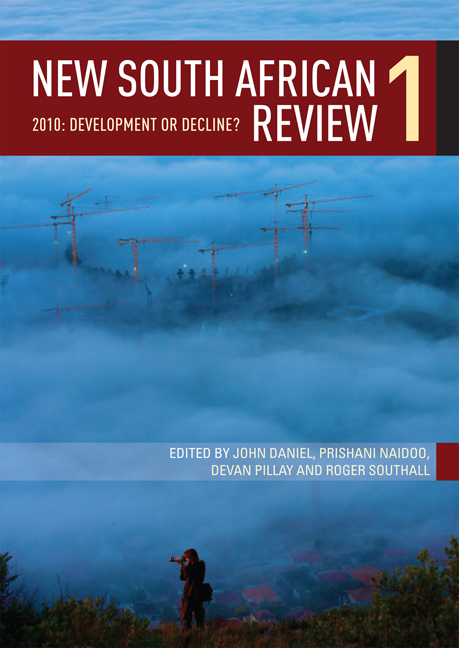Book contents
- Frontmatter
- Contents
- Preface
- Introduction South Africa 2010: From short-term success to long-term decline?
- PART 1 ECONOMY, ECOLOGY AND SUSTAINABILITY
- PART 2 STATE, POLITICS AND POLICY
- PART 3 EDUCATION, HEALTH AND LAND
- PART 4 Doreen Atkinson
- INTRODUCTION Signs of social decline? Crime, prisons, child trafficking and transactional sex
- CHAPTER 17 Our burden of pain: Murder and the major forms of violence in South Africa
- CHAPTER 18 Waiting for Godot: Awaiting trial detainees in South Africa
- CHAPTER 19 Wolves in sheep's skin: Trafficking of children in Musina, Limpopo Province
- CHAPTER 20 Relationships of exchange amongst South African youth in an age of conspicuous consumption
- Contributors
- Index
CHAPTER 19 - Wolves in sheep's skin: Trafficking of children in Musina, Limpopo Province
from PART 4 - Doreen Atkinson
Published online by Cambridge University Press: 21 April 2018
- Frontmatter
- Contents
- Preface
- Introduction South Africa 2010: From short-term success to long-term decline?
- PART 1 ECONOMY, ECOLOGY AND SUSTAINABILITY
- PART 2 STATE, POLITICS AND POLICY
- PART 3 EDUCATION, HEALTH AND LAND
- PART 4 Doreen Atkinson
- INTRODUCTION Signs of social decline? Crime, prisons, child trafficking and transactional sex
- CHAPTER 17 Our burden of pain: Murder and the major forms of violence in South Africa
- CHAPTER 18 Waiting for Godot: Awaiting trial detainees in South Africa
- CHAPTER 19 Wolves in sheep's skin: Trafficking of children in Musina, Limpopo Province
- CHAPTER 20 Relationships of exchange amongst South African youth in an age of conspicuous consumption
- Contributors
- Index
Summary
There is a dearth of accurate information about the incidence and prevalence of child trafficking in South Africa. It is held that South Africa is the site of internal trafficking whereby people are moved from rural and peri-urban areas to urban centres, tourist locations and sites of infrastructural development or agricultural growth. In addition, various reports state that South Africa is a source, transit and destination country for the trafficking of children and adults for the purposes of labour and sexual exploitation, and that children are trafficked from countries in the southern African region and elsewhere in Africa including Angola, Botswana, Democratic Republic of Congo, Lesotho, Mozambique, Malawi, Namibia, Swaziland, Tanzania, Zambia and Zimbabwe (International Organisation for Migration (IOM) 2003; 2006). Few reports, however, provide an in-depth analysis of trafficking along the South Africa-Zimbabwe border, the subject of this chapter.
Anecdotal evidence and the high level of migration of people from Zimbabwe into South Africa suggest that trafficking in persons may be taking place in Musina, where economic migrants, unaccompanied minors, asylum seekers and others wait in abhorrent conditions for the possible regularisation of their legal status. These migrants may be vulnerable to trafficking.
This chapter is based on the findings of a rapid assessment commissioned by the International Organisation for Migration (IOM), which sought to ‘understand and tailor responses to the vulnerabilities and characteristics of trafficking in the Musina border area of South Africa’ (IOM 2009d). In addition to a literature review, data was collected over a period of fifteen days, from 29 July 2009 to 15 August 2009, in Musina and in Beitbridge, a border town in Zimbabwe. Focus group discussions and interviews were conducted with 140 key state and non-state informants and migrants (on the streets, in brothels, in shelters, on farms and at the border). The focus is on the vulnerabilities of migrants in Musina and the mechanisms by which they may be trafficked.
DEFINITIONS AND CONCEPTS
In the sparse literature on trafficking in human beings, discussions about definitions and conce pts are often lacking in depth and nuance. For instance, conceptual debates often overlook the fact that the international definition of child trafficking is distinct from the definition of trafficking of persons. Trafficking is also often conflated with kidnapping or smuggling, which affects incidence and prevalence estimates.
- Type
- Chapter
- Information
- New South African Review2010: Development or Decline?, pp. 426 - 446Publisher: Wits University PressPrint publication year: 2010



